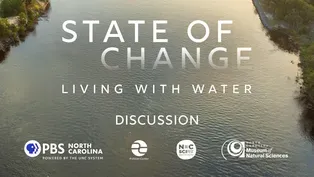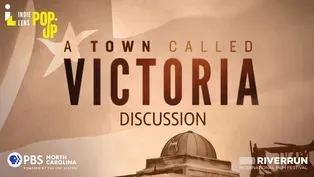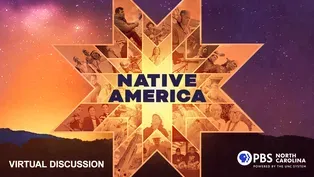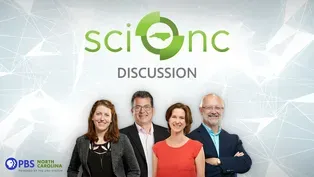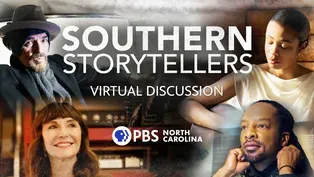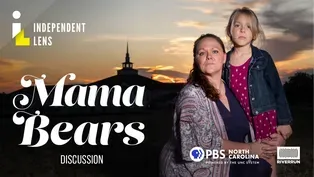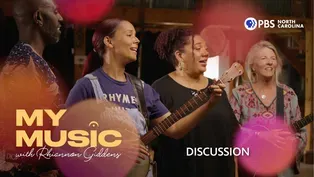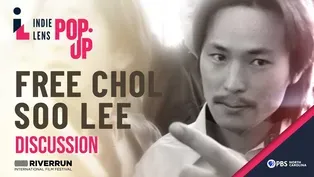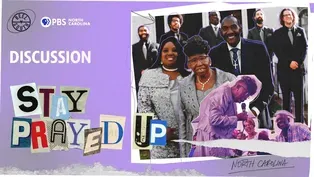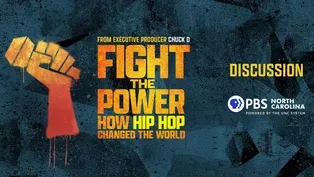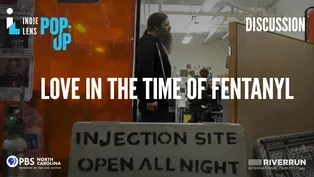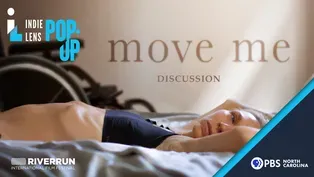PBS North Carolina Specials
Discussion - Storming Caesars Palace | Independent Lens
3/7/2023 | 33m 2sVideo has Closed Captions
Local professors and nonprofit leaders discuss welfare and the social safety net.
Kenia Thompson, host of “Black Issues Forum,” leads a conversation about the social safety net, welfare and resources for underserved communities. Panelists are La’Meshia Whittington, adjunct lecturer at NC State and Meredith College and executive director of The Green Majority; and Yarneccia D. Dyson, MSW, Ph.D., a professor and the department head of NC State School of Social Work.
Problems with Closed Captions? Closed Captioning Feedback
Problems with Closed Captions? Closed Captioning Feedback
PBS North Carolina Specials is a local public television program presented by PBS NC
PBS North Carolina Specials
Discussion - Storming Caesars Palace | Independent Lens
3/7/2023 | 33m 2sVideo has Closed Captions
Kenia Thompson, host of “Black Issues Forum,” leads a conversation about the social safety net, welfare and resources for underserved communities. Panelists are La’Meshia Whittington, adjunct lecturer at NC State and Meredith College and executive director of The Green Majority; and Yarneccia D. Dyson, MSW, Ph.D., a professor and the department head of NC State School of Social Work.
Problems with Closed Captions? Closed Captioning Feedback
How to Watch PBS North Carolina Specials
PBS North Carolina Specials is available to stream on pbs.org and the free PBS App, available on iPhone, Apple TV, Android TV, Android smartphones, Amazon Fire TV, Amazon Fire Tablet, Roku, Samsung Smart TV, and Vizio.
Providing Support for PBS.org
Learn Moreabout PBS online sponsorshipMore from This Collection
Discussion - State of Change: Living with Water
Video has Closed Captions
Panelists discuss resilient North Carolinians adapting to climate change. (28m 54s)
Discussion - A Town Called Victoria - Independent Lens
Video has Closed Captions
The filmmaker and former Victoria residents share their story. (46m 51s)
Discussion - Native America Season 2
Video has Closed Captions
Panelists discuss preserving the languages of Native American tribes. (39m 1s)
Video has Closed Captions
Sci NC executive producer and host, Frank Graff, chats about upcoming Season 6 of Sci NC. (26m 6s)
Discussion - Southern Storytellers
Video has Closed Captions
Author David Joy and others discuss storytelling and their new PBS series. (42m 13s)
Discussion - Mama Bears | Independent Lens
Video has Closed Captions
Producer and director Daresha Kyi discusses the film and LGBTQIA+ advocacy. (34m 41s)
Discussion - My Music with Rhiannon Giddens
Video has Closed Captions
Discussing the series with producers Will & Deni McIntyre and country artist Rissi Palmer. (39m 56s)
Discussion - Free Chol Soo Lee | Independent Lens
Video has Closed Captions
Local lawyers, professors and nonprofit leaders discuss wrongful convictions and reentry. (40m 44s)
Discussion - Stay Prayed Up, Reel South
Video has Closed Captions
The filmmakers discuss their journey with Mother Perry and The Branchettes. (45m 4s)
Discussion - Fight the Power: How Hip Hop Changed the World
Video has Closed Captions
Local experts discuss the history of hip hop with PBS North Carolina. (59m 43s)
Discussion - Love in the Time of Fentanyl | Independent Lens
Video has Closed Captions
Local harm reductionists, therapists and others discuss the opioid crisis and more. (55m 44s)
Discussion | Independent Lens: Move Me
Video has Closed Captions
A dancer with blindness and disability advocates discuss adaptable arts programs. (38m 46s)
Providing Support for PBS.org
Learn Moreabout PBS online sponsorship- Good evening, I'm Kenia Thompson, host of "Black Issues Forum," and I'd like to welcome you and thank you for joining us for such an important film and conversation.
We are so thrilled to present this Independent Lens film, "Storming Caesar's Palace," featuring activists and changemaker, Ruby Duncan, in alignment with Women's History Month, and National Social Work Month.
We wanna take time to provide a safe space for an open and informative community-driven discussion, so we ask that you please be respectful when entering your questions and comments in the chat to the right of your screen.
Everyone has different opinions and viewpoints, but we're here to share experiences and learn about the social safety net, resources, and ways to help struggling families connect with social workers, and the services and resources that they need.
So please note that this discussion is being recorded, and will be available to view again at your convenience.
All event attendees will receive a link to the recording, and the discussion will be posted on our website in the engagement section.
Participating in our discussion this evening are two very impressive, wonderful, local professors and nonprofit leaders.
Thank you both for joining us here.
We have La'Meshia Whittington, Professor, Principal, CEO of Whittington and Stanley Consulting Group LLC, as well as the Executive Director of the Green Majority.
And joining her we have Yarneccia D. Dyson, PhD in MSW, Professor and department head at North Carolina State University School of Social Work.
Thank you both for being here.
So, question to start off with Dr. Dyson.
Unfortunately, it seems like things really haven't changed very much, right?
Since that day or those times back in 1960s in Vegas where Ruby Duncan and her peers fought for this right.
As a social worker and professor of social work, what processes are in place to make things easier and fairer across the board?
- Thank you so much, Kenia, for that question.
So, first, different processes that are currently in place are the acknowledgement of how structural racism and implicit biases have shaped social welfare policy in this country.
And so what we're doing is working on, within each of our programs, moving forward with an anti-oppressive and an anti-racist lens.
That is embedded within our council on social education's educational policy and accreditation standards, which means any program that graduates a student with a bachelors or masters degree in social work has to adhere to these policies in order to make sure that we're preparing students to serve communities, individuals, families, and organizations.
It also means these anti-oppressive practices and anti-racist practices are embedded within hiring structures and who's teaching in these programs, who's being the administrators to these programs, as well as ensuring that we're sending students into field education opportunities where they're with the community, learning from the community, trusting the community to be experts to their lived experiences, while also emphasizing cultural humility, and understanding how these practices in the country, these policies have disadvantaged and historically oppressed and minoritized communities.
- Good work being done.
La'Meshia, I'd like to pull you in here.
Talking about pulling ourselves up by the bootstraps, and personal responsibility, attitudes, those stigmatize people who are struggling to make ends meet or just simply survive, right?
The word poor has also been used as a code for black, and as a race baiting tactic to drive a wedge between people of all races.
In your experience, what can we do to help dispel these myths, and enlighten and educate folks out there?
- Well, that's a wonderful question, Leader Thompson, and I'm just appreciative to be a part of this community discussion with fellow subject matter expert, and really honoring Leader Ruby Duncan as we talk about exactly what can we do to continue, right?
There's already been an incubation, as we saw in this premiere here, this incubation of not only grassroots organizing, but policy engagement and activation, and what it really means to create enforcement and policy.
And so, what can we do broadly as residents of this country, of this nation is understanding first the historical grounding, the reason that social welfare was created.
And once we know when we are grounded with facts, we can move together in unison to really ground who is directly impacted, and who is leading the charge to shift the impact while they are shouldering the impact.
And oftentimes, we don't regard folks as experts in community when they are very much the subject matter experts.
And so, the beginning of the Great Depression was actually the launch of the social, the modern social welfare system as we know it from the United States.
And even modern, as we call it, the modern social welfare system, social welfare isn't new, but for us it began with the Great Depression, and we saw corporations begin to bottom out.
We saw that the actual income that folks were then dependent upon as employees, because it went from a farming, right, agricultural economic landscape to an industrialized landscape.
And because of that, that impact was greater actually on white Americans.
And so because of that, there was a bailout, and that bailout was called social welfare.
And so, the social welfare didn't include a racial justice lens until leader Ruby Duncan, and then many black mothers who led the protest on behalf of all peoples who were on social welfare, even though black community members are not the largest recipients, even to date, of social welfare.
They still led the burden, right, of that protest, so racial justice wasn't actually a lens that was included until the civil rights movement era, and specifically the 60s, so you had 30 years of the strengthening of the social welfare system in the absence of racial inclusivity.
So when we talk about dispelling myths and we talk about dispelling biases, we have to be ground in information that is without our personal biases.
It isn't a psychological, individual bias to bias or experiences to experiences, more sociological.
It's from the equal life view to look at what policies and what crisis birthed the social welfare system, that was the Great Depression that led into the New Deal and the creation of jobs.
And so as we begin to unpack those biases, we start there.
- Yeah, yeah.
I was right there with you.
I made a note while watching earlier, welfare had a new face, right?
It was no longer a color issue, it was a people issue once it impacted a certain group of people.
Dr. Dyson, I'd love to come to you.
What role do social workers play in finding assistance and resources for families in need, such as Ruby's families, and those other ladies that we saw?
- Sure, sure.
So, I wanted to also piggyback on what La'Meshia was talking about.
- Please.
- One of my favorite courses to teach in social work programs is the introduction to social work, as well as the social worker policy course.
And in that course, we talk about decolonizing and deconstructing those exact programs.
A lot of people talk about the New Deal programs that were born out of the 1935 Social Security Act, they talk about ADC, and I remember the transition from ADC to AFDC to aid families with dependent children.
And then in 1996 when President Clinton was like, "We're gonna end welfare as we know it," and create TANF, Temporary Assistance for Needy Families, what happened then, and who was disadvantaged?
And so through those courses in our social work curriculums, we emphasized looking at the policies, did they do what they were intended to do?
Did they actually help people, or harm families when they were implemented by the federal government?
And of course, relinquishing rights to states.
Things that social workers can do to help family, this happens in a variety of ways, and one of the most important ways, of course, is to engage with families when they meet with them, and that also requires social workers to have a deconstructed, and a racial equity focused lens when they're approaching a family.
If a social worker has a certain purview or perspective or implicit bias about a family, especially in Ruby Duncan's case of black family, where back then they were making these comments about people are having these illegitimate children, there are no children that are illegitimate, you know?
All children are legitimate, you know?
So, these different ways in which they define them.
So social workers can help these families by connecting and engaging with them, seeing them as human, of course, partnering with them to identify what the family's needs are, because nothing's worse than having a social worker intervene and say, "I'm gonna come in your house.
I'm going to tell you you need to do A, B, and C." If that doesn't actually meet the need, increasing communication, and then identifying, of course, what are the specific needs the family hasn't identified?
And then partnering with other community-based organizations, our social services or agencies and organizations in order to ameliorate whatever needs is happening so that the social worker is only involved for a temporary moment of time.
Once they pull out of the family, the family is able to sustain themselves, and move on forward with living life.
- And you bring up such a good point, a lot of times families are afraid to reach out to social workers because of that experience that one family has had.
All it takes is one family to have a negative interaction with the social worker for that trickle down conversation to happen that you can't trust social workers, so it's good to know that that training is being made, and that class, I'm sure, is very important for your students.
La'Meshia, when we talk about, "The system is broken," would you say that this is a true statement?
- The system is broken, for whom?
Now, that's a very important question, right?
Because we still see an ongoing fight for communities of color to still be regarded as American citizens, no matter how many generations we've been here, some of us being even indigenous, right?
And so the system, in my humble opinion, is working as it was intended to work, right?
And the reality is when we take a step back, again, we look at modern implications, but the modern implications didn't create itself last year, right?
And so historically, the colonization and the acquisition of theft of indigenous lands, Native American lands is what actually birthed the plantation model, 'cause they had to have the property to create the plantation system, which is an international system that dealt in international imports and exports.
That's what gave the actual foundation to the corporation system that we are now talking about that doesn't provide enough benefits for folks.
That's where the wait staff came from, it was the plantation model.
That's where the manufacturing plants came from, it was the plantation that actually birthed the corporation, it was the inception, so why is that important?
Is because when we talk about the system was built to always extract from a certain group of people for the economic prosperity of the nation.
We even talk about, in 1855, 4 million enslaved people were worth 3 billion dollars.
So the social welfare system, if it was for all people in its inception, it would've been instituted in policy and past in 1865 when the emancipation papers were official.
It would've been there to help a body of people that aided and created the economic prosperity in the very jobs, the very workforce that they are and have been historically alienated from, that social welfare system could have been an opportunity to ensure that gap was mitigated in them acquiring generational wealth.
- Yeah.
- So when we talk about, "Is the system broken?"
Not so much, it's more the illusion is broken that there is a fair and equitable delineation of social good and social services if we really break down, when did social welfare include inclusive policies and practices for people of color?
It wasn't at the same time that we were already dealing with social depravity and economic disparity.
- Good points.
Dr. Dyson, what's the mission of the School of Social work at North Carolina State University?
And, two-part question, and what are the key areas of focus that emphasize to students via coursework, research, and hands-on experience?
- Sure.
The mission of the School of Social Work at North Carolina State University is to prepare students for practice that's sensitive to the social, economic, environmental, diversity and justice needs, the cultural demographics of the political landscape.
And I say that as we sit in the state of North Carolina, given everything that's happening with this current year.
Within a framework of empowerment, we emphasize professional ethics for our students to go out and not do any harm, further harm to communities because of what we talked about, and how the social worker was seen historically.
This is also why our profession and our accreditation body, we are doing our own work in deconstructing and decolonizing our curriculums, and reckoning with the history of social work and understanding that social work has harmed communities that it was set up to actually help.
And some of our key areas of focus are our clinical practice, of course, many students are coming in and wanting to be able to go out and help their communities, especially those who identify as historically marginalized or oppressed, as well as the macropractice in the advocacy work.
And one thing I think about even on this setting is that this comes full circle, because one of my academic mothers and mentors, Dr. Esther Jones Langston, she was in Las Vegas when all this was happening, and she told me how they actually prepared the students to go down and lobby and advocate with Ruby Duncan, so this is truly a full circle moment.
So we also prepare our students to learn how to lobby and advocate for their different rights, and the rights of all people.
And so our internship opportunities, we regard them as field placements in social work education, and so field is our signature pedagogy.
And for MSLB and BSLB students, they have to do a minimum of 400 to 600 hours in an agency setting, demonstrating all of the core competencies and those accreditation standards that we talked about.
So that means that we are monitoring and managing how effective students are with engaging in practice that's anti-racist, that's anti-oppressive, that they're able to not replicate any harm, but also bring new initiatives, bring new ideas to serving families, because it's not a cookie cutter approach to helping these different families.
Different research areas include diversity, equity, and inclusion, of course, LGBTQIA+ topics, as well as leadership and mentoring policy analysis in public health.
- Nice, I love that full circle moment with your mentor.
- Yeah.
- That's amazing, who would've thought, right?
- Right.
- La'Meshia, I wanna bring you back in.
There was a report, 2022, from the Bureau of Labor Statistics that indicated 6.3 million Americans, 4.1% were among the working poor, people who spend more than half of the year, 27 weeks in labor force, working, or looking for work, but their income falls below the poverty level.
What can we do about this?
That's a huge question.
[Kenia and La'Meshia chuckling] - And I always define the we.
I always define the we, right?
- Right, right.
- And I look at, when we talk about state and federal government, social welfare, which is the topic for today, it was created as a response to a crisis.
If we look at tribal communal practices, mutual aid, what other villages have conducted in ancestral practices, actually social welfare was built into the tapestry of the community, that when cousin or family or friend couldn't afford or couldn't make ends meet, the community already had this safety net built in to say, "We'll help the least of these."
- Yeah.
- Well, the government didn't create that, it was a village mindset or a cultural healing mindset.
They didn't practice or learn, those equitable practices from the Native Americans, indigenous communities, Afro-alike, and instead profiteered and created a funding model from also social welfare by including insurance companies in the conversation.
So it wasn't built on the front end for folks, just in case someone needed, and the reality is it was always going to be a need of social welfare because the transformation of the economy.
It went from folks being able to live sustainably off the land, always providing for their people.
When we talk about getting back to the basics, how can we assure people can provide for their folks?
We have to understand what the economy is built on.
The economy is built on the need for wages, the need for hours.
That's the kind of economy we have.
We no longer have agricultural economy, so that renders our people having to be dependent on a corporation system, so where's corporate accountability?
Where's corporate responsibility, and where's the mechanism that enforces them to do both when they are not actively participating in social good, even though they're benefiting off of our labor, but not giving the folks benefits?
So when we talk about the working poor, that happens when folks can't afford their utility bills, energy burden, that happens when folks cannot afford their rent, gentrification, that happens when folks cannot afford a primary physician, and they can only get to the emergency room.
But state budgets are limited now, and rural hospitals are closing at a high rate.
- Yeah.
- Then we add pandemic, COVID-19, we compare these numbers, and we are not new to crisis, so why are our responses to crisis not built in before?
And then we are surprised when folks that have already been in a crisis are further put into a bind when something new comes up.
When we say the Great Depression, 13 million folks were out of the labor force out of 52 million.
I know we've grown in population when we talk about data, but 13 million was outta the labor force.
Okay, COVID-19.
All right, we got 20.5 million.
We have to compare where we continue to go wrong, because during the Great Depression folks said, "The old America died."
Are we prepared for that repeat if we don't prioritize the very people who are the bedrock of this nation?
- Yeah.
Oh, Dr. Dyson.
Earlier on in the documentary and in the piece that we watched, it talked about, you know, welfare was unemployment, was disability, was everything that the government could provide as far as assistance goes that anyone would need, but then we talked about this social service lens, and then it became this negative connotation.
It became synonymous with black, it became synonymous with poor.
And even today, it still carries this feeling of, "I don't want to let others know that I'm on welfare."
My question is, how do we start to really disassociate that, or is that even possible?
Can we do that?
Can we remove that negative connotation away from the word welfare?
- I think honestly it's going to continue to take work, and we can eventually get there, but I think it, a lot of it has to do with how people see other people.
And so, because that connotation has always been associated with black people, black women, the welfare queen, welfare mother.
I mean, it goes all the way back to Patricia Hill Collins, and other black feminists who talked about the intersectionality of race and gender and class, and how black women are classified in this country.
And so, trying to get away from it, do we have everyone willing to buy into seeing us as human?
Even back then, they didn't see these women as women, they saw them as property, so they were willing for them to work in these hotels as temporary workers, and be paid little to nothing.
And then if they needed assistance, then they're like, oppressing them for needing this assistance, or cutting the assistance off unregulated.
And so, I believe we could eventually get there, it'll take that work together.
So hopefully we're able to, but it also goes back to decolonizing these minds, these processes, the way things are set up.
A lot of people will say, "These are the rules," or, "This is how things always were," but understand when rules and policies were written, what framework were they written under?
Who wrote the rules and policies?
When they wrote these rules and policies, who did they have in mind to help, and who did they have in mind to harm?
So I think about all those things, and those are factors that I challenge my students, my faculty staff, and even my mentees that I support, understanding, if we're able to get to this, if we wanna get to true social, economic, and environmental justice, what does that require by all people, and is everybody willing to do that work?
I think that in 2020, we saw a lot of statements that came out, we saw a lot of these actions and people waking up.
I remember sitting in a training where someone said that they had never even heard of Bloody Sunday.
This was last year.
How amazing could it be to live in a world and never ever understand the plight of some people in this country?
So I think that it's gonna take an effort, and we can eventually get there, and hopefully we'll be able to, but discussions and conversations like this, providing a space for people to just sit and listen, to understand what we're thinking about, and what is needed to move things forward can be one of the solutions to this.
- La'Meshia, we've seen mass movement with mass protests, right?
We've seen Trayvon Martin, George Floyd, we've seen all of these changes or conversations starting with this need for a mass movement.
And we saw that in the film as well, when they literally blocked off that main strip.
And if you've been to Vegas, you know, if you block that off, everything is blocked off, right?
But why does it take, is my question, why does it take so much for people to listen, for people to pay attention, for people to care?
Why does it take so much?
- Right.
I think that's a very dynamic question, and I think about the word politics, and poli, the first portion of the word actually means people, right?
When we talk about ancient languages, and it was always intended when we're talking about mass movements, it's just that it takes more than one person to move the pendulum.
And I would even say for African Americans, for my people, we're oftentimes very spiritual people.
And the Walls of Jericho, that is a biblical practice by which many of us heard in Sunday school growing up, that a historical people marched numerous times, right?
They marched, sounds very familiar, and they cried out, sounds very familiar.
So there is a spiritual component to movement work, and oftentimes we lose that piece in history.
And I, as an I statement, believe that it takes the people because power corrupts, money persuades.
But when the people are oppressed, we actually move the pendulum of change because money isn't flowing for our people.
So, the blessing that we have in abundance is our voice.
The blessing that we have in abundance is our village, who is cooking in the back kitchen to provide the meals at the jail, who's raising the bail money?
Who's given their home, no matter how old it is, Miami Grandmama's old house, who is giving the home for the organizing meetings, who's giving the church?
These are practices that are very historic to us, and it always started with community.
And it's really nothing about us without us is for us, and it's just always been centered around the people.
When we talk about the civil rights movement, we think about the 1960s, but that wasn't the first civil rights movement.
There were actually two in the late 1800s, so we even, right out of chains, we were protesting for our right, right?
There were rebellions during that period, but after emancipation, we still were changing and challenging oppressive policies, that hasn't changed.
And so I'm very motivated, I was very excited to really be charged by, again, looking at this premier, because it is so spiritual for us that we organize, we come together in unison, and the Walls of Jericho do fall down.
- Dr. Dyson, a couple minutes left here together.
I wanna talk about what's going on now in North Carolina with Medicaid, and this feels almost reminiscent to what we're seeing in the film, right?
It's this fight just for basic coverage for folks that fall in this gap that you would think, "Okay, I make enough, but I don't make enough to pay for my own insurance, but for some reason you're telling me I make too much."
What are your thoughts on that, does it feel like history of repeating itself?
- It does feel like history's repeating itself.
When you opened and you mentioned, I was happy when you mentioned that this is social work month, and so I'm using the Zoom background, social work breaks barriers.
History repeating itself means that there continues to be barriers that we have to break, and so these barriers related to healthcare access, who gets access, who is able to afford medical care are important for social workers across the world.
In North Carolina, with what's going on with Medicaid expansion, my thoughts are that, you know, people, if someone is sick, it shouldn't take someone, people or families not being able to access their basic needs to be covered, and if they go and access it, then they have this bill of 5, $10,000 to pay for.
So, my short version answer to that is that I'm continuously engaged in advocacy efforts with our students and faculty and staff, as well as commiting to advocate for more expansion of Medicaid.
And of course, this is why we highly recommend people get out to the polls and vote, and vote for their best interests so that everyone is able to have this access, and I know that that is counter to the way many people believe because we still have that, "Pull yourself up by the bootstraps," that we teach in social work to acknowledge that this was a thing, even back to the man in the house rules.
So if you have a man in the house, you couldn't get welfare or get insurance.
So, my thoughts are that there's still much work to be done.
And myself, Dean Ramona Brinson, who's also from Las Vegas, she, at UNC Chapel Hill School of Social work, we're doing the work and mobilizing coalitions of other social work programs to advocate for these Medicaid access to be expanded, and other things.
- La'Meshia, I know you do a lot of work as well, I'd love to open that question to you.
Is history repeating itself, what can we do to change that narrative?
- Just in concert agreement of Dr. Dyson, history is absolutely repeating itself as cyclical.
When we all collectively faced globally, but of course, hyper-local here in the nation, COVID-19, we were very much in a place of Spanish Flu 1919.
And so, our responses to the pandemic was very similar as then, when we saw historic houselessness, our folks were already dealing with houselessness, our folks were already in alternative housing.
So as we were engaging, and that's what we do at the Green Majority, we engage with voting rights.
We engage with free districting.
If we are unfairly gerrymandered, we can't vote our way into fair representation because someone else has rigged it in a way that directs our vote to who they want it to go to.
And then it turns out that elected official who rigged that voting map is also receiving campaign dollars from a corporation.
And then on top of that, they don't pass a state budget for several years.
Okay, what organization, what university can't pass a budget annually?
But our state, it was permissible for it to be several years.
So when we understand the cost of inflation, when we talk about disparate impact becoming that much more disparate, communities had to choose between lights or staying at home, when in a shelter in place, you shouldn't have to choose.
When we talk about the fact that there wasn't a policy, didn't require employers to social distance folks, so then our communities were LatinX communities, African American communities, but we can keep going.
We're the first to contract COVID-19 at higher rates, because of the lack of social distancing, the lack of support of sick days, the lack of actually giving out masks, how many times can we subjugate community members, black and brown folks alike, low-wealth populations as well, to the same disparate treatment over and over again and be surprised that folks continue to need social welfare when we built the system to be just that?
And then shame them, gaslight folks.
And let's be very clear, Black American buying power is projected to reach 1.8 trillion by next year.
- Wow.
- So, let's call it what it is, we wanna create these biases and gaslight, and you said this very well, place a face to the movement.
Now let's put data to the movement, and let the voices that ring out for the protests be the actual face of the movement, the face of what should be shifted in policy, and then it be heard in the actual chambers when the gavel knocks and says it's an official law, and then we wouldn't have state section violence.
We wouldn't have to take to the streets if they listen the first time to the people, but let's not gaslight us to say that black communities are not taxpayers when we have going on 1.8 trillion, every time we purchase, we pay taxes.
So, we'll stop there.
- You can go on, I know.
If those words don't get you moving, I don't know what will, so I appreciate both of your insights, both of your comments.
There's a lot of conversation that still needs to be had, but obviously we only have a little time together this evening, so thank you to you both for sharing your time and your expertise, and we wanna thank you guys who are watching, for logging on, and participating in the conversation.
You can watch the full broadcast length version of "Storming Caesar's Palace" on Monday, March 20th at 10:00 PM on PBSNC, or your local PBS station.
You can also stream it at any time after March 20th online, or download the free PBS app to watch there as well.
Independent Lens airs every Monday at 10:00 PM on PBSNC.
To share your thoughts and comments with us and the filmmakers, please click on the link in the chat to your right to complete an audience survey.
You will be eligible to win $50 gift card if you provide a valid email address with the complete survey.
Please be on the lookout in your inbox for an email early next week with the names, organizations, and websites of tonight's panelists, when and how to watch the film, and a link to this discussion.
The survey link will also be included in that same email.
And then you can watch me on Friday evenings on "Black Issues Forum" at 7:00 PM.
To ensure PBS North Carolina continues to bring you popular PBS shows, riveting documentaries, informative how-to programs, fun lifestyle shows, Rootle, our 24-hour kids channel, and free informative screening events like this one, I hope that you are inspired to make a tax deductible donation to PBSNC safely and securely at PBSNC.org.
If you already are a member, we appreciate you and we thank you.
Thanks again for joining us.
I hope you stay safe and stay well, and most importantly.
Support for PBS provided by:
PBS North Carolina Specials is a local public television program presented by PBS NC
